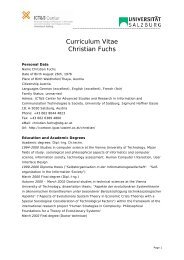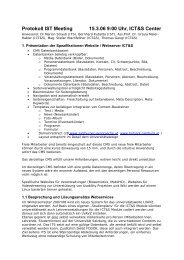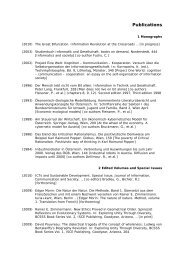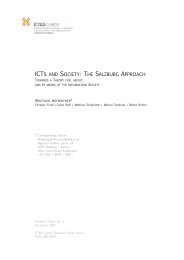CHRISTIAN FUCHS - ICT&S - Universität Salzburg
CHRISTIAN FUCHS - ICT&S - Universität Salzburg
CHRISTIAN FUCHS - ICT&S - Universität Salzburg
Create successful ePaper yourself
Turn your PDF publications into a flip-book with our unique Google optimized e-Paper software.
Christian Fuchs: Social Networking Sites and the Surveillance Societytoward a model of ‘collaborative’ or ‘collective intelligence’ needs to bequestioned with some rigour” (Beer 2008b: 523-526).In short, Beer’s critique of boyd and Ellison is that the approach is individualistic, toooptimistic, and ignoring that ISNS are embedded into capitalism and are primarilycorporations with capitalist interests.Just like techno-pessimism, techno-optimism is a one-sided discourse that ignores themultiple, contradictory causality of complex systems (Fuchs 2008). Just like that it isunlikely that ISNS only put users at risk, it is one-dimensional to assume and unlikelythat ISNS only empower users. The empowerment discourse is also individualisticbecause it focuses research primarily on how individuals use ISNS for makingconnections, maintaining or recovering friendships, falling in love, creatingautonomous spaces, etc. It does not focus on how technology and technology use areframed by political issues and issues that concern the development of society, such ascapitalist crises, profit interests, global war, the globalization of capitalism, or the rise ofa surveillance society (cp. Fuchs 2008).Further examples for the techno-optimistic empowerment discourse on ISNS can begiven. Such studies stress especially the opportunities for forming and maintainingsocial relationships of various kinds. The following discussion is not complete, i.e. onlyexemplary, and is presented chronologically.Donath and boyd (2004) hypothesize that social networking platforms are technologiesthat are more suited for forming and maintaining weak ties than strong ties. Ellison,Steinfield, and Lampe (2007) conducted empirical research on the quality of socialconnections in the social networking platform Facebook. Their method was aquantitative empirical online survey with a random sample of 800 Michigan StateUniversity undergraduate students, from which 286 completed the survey. The majorresult of the study was that “participants overwhelmingly used Facebook to keep intouch with old friends and to maintain or intensify relationships characterized by someform of offline connection such as dormitory proximity or a shared class”. There was astress on “connecting with offline contacts as opposed to meeting new people”.Facebook users used the platform for maintaining strong social ties and forming weaksocial ties. Facebook“may help individuals to maintain pre-existing close relationships, just as it can beused as a low-maintenance way to keep tabs on distant acquaintances. (…)Online interactions do not necessarily remove people from their offline world butmay indeed be used to support relationships and keep people in contact, evenwhen life changes move them away from each other” (Ellison/Steinfield/Lampe2007).Another survey (N=1440, Lampe, Ellison and Steinfield 2006a) at Michigan StateUniversity showed that students have high confidence that their profiles describe themaccurately (mean=4.16 of 5). There was high agreement to the statement that oneengages in keeping in touch with old friends and checking out the Facebook profiles ofpeople one has met in person.18









